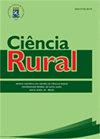Antibacterial activity of electrolyzed water on Pseudomonas syringae and Clavibactermichiganensis and its effect on seed germination
IF 0.9
4区 农林科学
Q3 AGRONOMY
引用次数: 0
Abstract
ABSTRACT: Tomato plants are a crop of great economic importance worldwide. Mexico is considered the world’s leading exporter of this vegetable, with a 24% market share. However, this crop can be affected by diseases such as bacterial freckle and bacterial cancer that can be introduced to plantations through infected seeds. Pesticides are used in agriculture for disease control and are considered a source of environmental pollution. Alternatives to the use of pesticides must therefore be sought. To this effect, electrolyzed water is a technology that has been shown to have antimicrobial activity. In this study, the antimicrobial activity of electrolyzed water on Pseudomonas syringaepv. tomato and Clavibactermichiganensis subsp.michiganensis was evaluated on cells suspension and tomato seed germination. Electrolyzed oxidizing water (EOW) and electrolyzed reduced water (ERW) treatments were applied for 1, 3 and 6 minutes. In addition, seeds were infected with each of the bacterial strains separately and electrolyzed water treatments were applied. Results show that oxidizing water is more efficient as an antimicrobial agent, as it achieved 100% growth reduction of the two bacterial strains after one minute of treatment. These treatments did not affect germination percentage, since germination percentages above 90% were obtained in all treatments and the seedlings were not affected in any of the evaluated variables.电解水对丁香假单胞菌和密歇根锁杆菌的抑菌活性及其对种子萌发的影响
摘要:番茄是世界范围内具有重要经济价值的作物。墨西哥被认为是世界上这种蔬菜的主要出口国,占有24%的市场份额。然而,这种作物可能受到细菌性雀斑和细菌性癌症等疾病的影响,这些疾病可以通过受感染的种子引入种植园。农药在农业中用于控制疾病,被认为是环境污染源。因此,必须寻找杀虫剂的替代品。为此,电解水是一种已被证明具有抗菌活性的技术。本文研究了电解水对丁香假单胞菌的抑菌活性。番茄和密管杆菌亚种。用细胞悬浮试验和番茄种子萌发试验对密根菌进行了评价。电解氧化水(EOW)和电解还原水(ERW)分别处理1、3和6分钟。另外,分别用不同菌株侵染种子,并进行电解水处理。结果表明,氧化水是一种更有效的抗菌剂,在1分钟的处理后,氧化水可以使两种细菌的生长减少100%。这些处理不影响发芽率,因为所有处理的发芽率都在90%以上,幼苗在任何评估变量中都没有受到影响。
本文章由计算机程序翻译,如有差异,请以英文原文为准。
求助全文
约1分钟内获得全文
求助全文
来源期刊

Ciencia Rural
AGRONOMY-
CiteScore
1.70
自引率
0.00%
发文量
233
审稿时长
2-4 weeks
期刊介绍:
The purpose of Ciência Rural is to publish the results of original research, note and reviews which contribute significantly to knowledge in Agricultural Sciences. Preference will be given to original articles that develop news concepts or experimental approaches and are not merely repositories of scientific data. The decison of acceptance for publication lies with the Editors and is based on the recommendations of Editorial Comission, Area Committee and/ or ad hoc reviewers. The editors and reviewers are external to the institution.
 求助内容:
求助内容: 应助结果提醒方式:
应助结果提醒方式:


